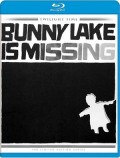| Reviews & Columns |
|
Reviews DVD TV on DVD Blu-ray 4K UHD International DVDs In Theaters Reviews by Studio Video Games Features Collector Series DVDs Easter Egg Database Interviews DVD Talk Radio Feature Articles Columns Anime Talk DVD Savant Horror DVDs The M.O.D. Squad Art House HD Talk Silent DVD
|
DVD Talk Forum |
|
|
| Resources |
|
DVD Price Search Customer Service #'s RCE Info Links |
|
Columns
|
|
|
Bunny Lake is Missing
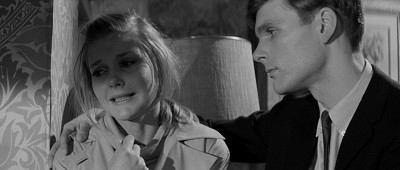 It's every parent's nightmare. Ann Lake (Carol Lynley) is in the process of moving from America to London, where she plans to live with her brother, Steven (Keir Dullea). She's got to get back to the new place to let the movers in, unpack as much as she can, and go shopping for dinner. When she arrives at The Little People's Garden, the new school for her daughter, Bunny, the woman she spoke to on the phone isn't around, and there are no teachers in sight, just the distant sound of children singing up on the second floor. Instead, Ann pops into the kitchen and finds a slightly disgruntled chef, who agrees to make sure Bunny is taken care of. Ann leaves and takes care of her business, but when she finally returns to the school to pick Bunny up, she's nowhere to be found. In fact, it's worse than that -- not one single person other than Ann and her brother even have any recollection of seeing her.
It's every parent's nightmare. Ann Lake (Carol Lynley) is in the process of moving from America to London, where she plans to live with her brother, Steven (Keir Dullea). She's got to get back to the new place to let the movers in, unpack as much as she can, and go shopping for dinner. When she arrives at The Little People's Garden, the new school for her daughter, Bunny, the woman she spoke to on the phone isn't around, and there are no teachers in sight, just the distant sound of children singing up on the second floor. Instead, Ann pops into the kitchen and finds a slightly disgruntled chef, who agrees to make sure Bunny is taken care of. Ann leaves and takes care of her business, but when she finally returns to the school to pick Bunny up, she's nowhere to be found. In fact, it's worse than that -- not one single person other than Ann and her brother even have any recollection of seeing her.
In the years since 1965, many thrillers have tried to copy the story or principles of Bunny Lake is Missing. It's a testament to director Otto Preminger that the film is not only the forefather of so many familiar suspense / mystery tropes, but that still manages to outshine the vast majority of its imitators. Preminger doesn't need much, just some strong characters and a cinematic paintbrush to blot out more and more possibilities as to what could have happened to poor Bunny. Without much narrative or stylistic effort, Preminger puts the viewer in Ann's shoes, sending them into their memories to retrace every one of her steps, reconsidering every strange or unusual detail, all while digesting each new curveball being thrown in the present. Preminger holds his shots as they sweep across hallways and all the way around rooms, robbing the viewer of the subconscious "reassurance" that he, the filmmaker, is just tricking the audience, hiding some truth inside edits or carefully chosen angles. As more and more reasonable explanations are taken away, the psychological pressure ratchets up, until it's nearly doubling with each new reveal.
After Ann returns to the school and can't find Bunny, she calls Steven. Their interactions with with the school's staff are noticeably aggressive and slightly antagonistic. Although it appears to stem from Ann and Steven being Americans, Preminger is already setting the viewer on edge, piercing the previously pleasant atmosphere. 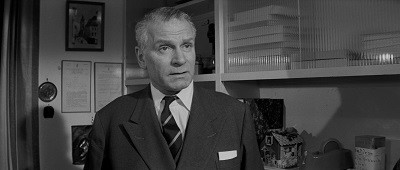 The school appears to be a labyrinth of cupboards, most of which remain closed, as if to suggest a haystack's worth of possibilities. Eventually, the pair call the police, bringing Superintendent Newhouse (Laurence Olivier) into the picture. Newhouse is an unwaveringly reasonable man, and he observes the situation as clinically as possible, if not entirely free of wry humor (at one point, he announces to Ann that he is about to inhabit the mind of a little girl). He is an excellent detective, speaking plainly and then carefully picking at whatever frayed threads appear on the people who respond. Olivier is a delight to watch, transforming what is essentially exposition into riveting character work, occasionally allowing himself a smile or a smirk whenever someone has a particularly telling or unusual reaction.
The school appears to be a labyrinth of cupboards, most of which remain closed, as if to suggest a haystack's worth of possibilities. Eventually, the pair call the police, bringing Superintendent Newhouse (Laurence Olivier) into the picture. Newhouse is an unwaveringly reasonable man, and he observes the situation as clinically as possible, if not entirely free of wry humor (at one point, he announces to Ann that he is about to inhabit the mind of a little girl). He is an excellent detective, speaking plainly and then carefully picking at whatever frayed threads appear on the people who respond. Olivier is a delight to watch, transforming what is essentially exposition into riveting character work, occasionally allowing himself a smile or a smirk whenever someone has a particularly telling or unusual reaction.
The film then takes the first of its many turns, none of which I will reveal here (although the style of the film's mystery reminds me of the fact that Reese Witherspoon was once attached to a remake; her decision to produce Gone Girl highlights the way the tone of that film echoes this one). Steven and some of the police officers return to the new flat and make a startling discovery, one that throws the entire disappearance into a whole new light. While Ann struggles to digest this new development, Preminger continues lining up suspects, most of them unforgettably eccentric. The chef Ann spoke to is nowhere to be found. Instead, there's Ada Ford (Martita Hunt), one of the two co-founders of the Little People's Garden, who now lives in a flat on top of the school, writing a book based on her recordings of children recounting their nightmares. Even weirder is Ann and Steven's landlord, Wilson (Noel Coward), who has decorated their new home with his extensive collection of African masks. He hits on Ann while carrying his chihuahua, and when the cops poke around his home for any sign of Bunny, he hands one of the officers a bamboo cane and says it arouses him to be smacked with it. Each new character swims in suspicious or alarming behavior, but none quite provide any logical leaps to kidnapping.
At the center of the increasing madness is Lynley, whose simple stylishness slowly unravels. Ann begins to seem like a cracking porcelain doll: her wild eyes imply she's becoming deranged with worry, her hair seems to fray without her touching it, and one imagines she's shaking constantly. Yet, it's not a hysterical performance, instead conveying the air of hysteria without going big or chewing the scenery. In contrast, Steven seems supernaturally calm, ending up in casual conversations with Newhouse, and Ada. 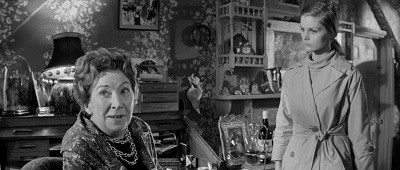 Whenever Ann is on the verge of a breakdown, he works out out a complicated line of reasoning to reassure her that, logically, Bunny's got to be fine. Ann bounces back and forth between Steven and Newhouse, two voices of reason that suggest some suspicion of her creeping in around the edges of their questions and comments. When Preminger finally reveals his hand, these character traits are only emphasized further, in a climactic sequence that crackles with unpredictability. Viewers may have to remind themselves to breathe.
Whenever Ann is on the verge of a breakdown, he works out out a complicated line of reasoning to reassure her that, logically, Bunny's got to be fine. Ann bounces back and forth between Steven and Newhouse, two voices of reason that suggest some suspicion of her creeping in around the edges of their questions and comments. When Preminger finally reveals his hand, these character traits are only emphasized further, in a climactic sequence that crackles with unpredictability. Viewers may have to remind themselves to breathe.
The Blu-ray
For this new Blu-ray of Bunny Lake is Missing, Twilight Time has stuck with the original poster art, minus the billing block and the memorable tagline ("No one admitted while the clock is ticking!"). The black-and-white cover is a reference to Saul Bass' ominous title sequence: a hand tearing strips out of black paper, revealing the credits. The single-disc release comes in an Infiniti Blu-ray case, and there is a booklet inside the case featuring an essay by Twilight Time's Julie Kirgo.
The Video and Audio
Presented in 2.39:1 1080p AVC, Sony has provided Twilight Time with a near reference-quality transfer. The credits, of course, are somewhat soft, which may briefly lower viewers' expectations, but the moment they end, the level of detail and depth on display in the black-and-white image is quite remarkable. Fine detail is very strong, especially in complex settings such as Ada's attic or Wilson's apartment, and there is no sign of digital manipulation of the image. The one minor quibble is that black levels seem a bit suspiciously impenetrable; there may be a very small amount of crush occurring. Sound is a DTS-HD Master Audio 1.0 track which features impressively crisp dialogue and strong separation (even with only one channel) of the dialogue and the music by Paul Glass. English captions for the deaf and hard of hearing are also included.
The Extras
Three extras are included, two of them sound-based. The first two are under the set-up menu, starting with an audio commentary by Twilight Time's Nick Redman and Julie Kirgo, and screenwriter Lem Dobbs. As with all Twilight Time commentaries, the track isn't heavy on analysis, more broken up into either pure fact or pure opinion. As the film plays, they provide a general overview of Preminger's style, background information on the cast and crew, and rave about the film and many of the artistic choices. A worthy supplement, in lieu of any of the surviving cast or crew speaking about the making of the movie. 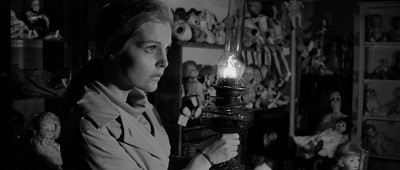 As Twilight Time buyers can guess, the other is an isolated music track, presented in DTS-HD Master Audio 2.0. Many will be delighted to know that this includes not only Paul Glass' score, but also the tracks by The Zombies that play when Ann and Newhouse are in the pub.
As Twilight Time buyers can guess, the other is an isolated music track, presented in DTS-HD Master Audio 2.0. Many will be delighted to know that this includes not only Paul Glass' score, but also the tracks by The Zombies that play when Ann and Newhouse are in the pub.
The disc rounds out with three original theatrical trailers, titled "Otto", "The Zombies", and of course, "Bunny Lake is Missing." There is also a menu-based version of Twilight Time's catalog, which identifies titles that are sold out.
Conclusion
Even if you've seen a hundred of the mediocre, B-grade thrillers that have followed a similar trajectory as Bunny Lake is Missing, Preminger's film gets under the skin almost immediately, starting by executing a simple premise well, and then adding further, dizzying reveals that will have the viewer frantically trying to put together what they've seen. Twilight Time's Blu-ray features a spectacular presentation of the film and a couple of fine extras. Very highly recommended.
Please check out my other DVDTalk DVD, Blu-ray and theatrical reviews and/or follow me on Twitter.
|
| Popular Reviews |
| Sponsored Links |
|
|
| Sponsored Links |
|
|
| Release List | Reviews | Shop | Newsletter | Forum | DVD Giveaways | Blu-Ray | Advertise |
|
Copyright 2024 DVDTalk.com All Rights Reserved. Legal Info, Privacy Policy, Terms of Use,
Manage Preferences,
Your Privacy Choices | |||||||









